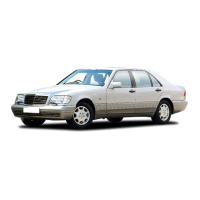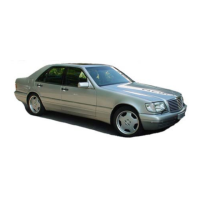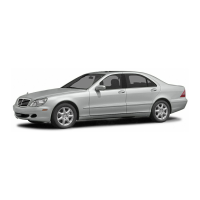549
Technical data
Service products and capacities
Fuel consumption
The vehicle will use more fuel than usual in
the following situations:
앫 at very low temperatures
앫 in urban traffic
앫 on short trips
앫 when towing a trailer
앫 in mountainous terrain
The consumption figures were determined
in accordance with EU Directive 1999/
100/EC under the following test condi-
tions:
앫 Urban driving conditions are simulated
by frequent pulling away and stopping.
앫 Common extra-urban driving condi-
tions are simulated by accelerating
from 0 to 120 km/h using all gears.
앫 Total fuel consumption is calculated
using a weighting of approximately 37%
for urban driving and approximately
63% for extra-urban driving.
i The actual consumption values of your vehi-
cle may deviate from the values given depending
on:
앫 Driving style
앫 Road and traffic conditions
앫 Environmental influences
앫 Vehicle’s operating state
Mercedes-Benz is constantly updating its
vehicles to the state of the art. Consump-
tion values are subject to change and may
therefore differ from those listed here,
which were correct at the time of going to
print. The current consumption values may
be found in the COC documents (EC CER-
TIFICATE OF CONFORMITY). These docu-
ments are supplied when the vehicle is
delivered.
! The use of non-approved fuel additives can
lead to increased wear and engine damage. The
use of such fuel additives which have not been
approved will limit your warranty entitlement.
H Environmental note
CO
2
(carbon dioxide) is a gas which scien-
tists believe to be principally responsible for
global warming (the greenhouse effect).
Your vehicle’s CO
2
emissions are directly re-
lated to fuel consumption and therefore de-
pend on:
앫 efficient use of the fuel by the engine
앫 the style of driving
앫 other non-technical factors, such as en-
vironmental influences or road condi-
tions
You can minimise your vehicle’s CO
2
emis-
sions by driving carefully and having it serv-
iced regularly.

